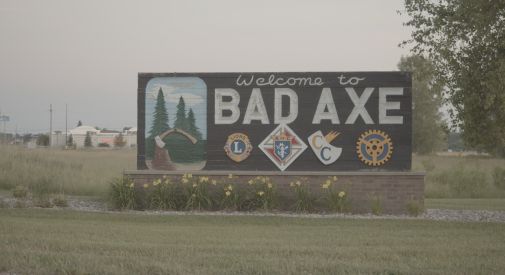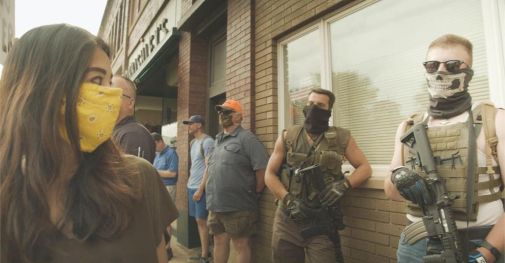Doc Corner: 'Bad Axe'
 Friday, November 18, 2022 at 11:24AM
Friday, November 18, 2022 at 11:24AM By Glenn Dunks

With a name like Bad Axe, it was only a matter of time before somebody made a movie about this town in Michigan. Bad Axe isn’t necessarily about the entire microcosm of this small town, preferring to focus on a single family (the director’s own) and their experiences within it. This isn’t Our Town; I mean, come on. You can’t pass up that title!
In telling the story of the Siev family in the town of Bad Axe, first-time filmmaker David Siev lands upon potent ideas of the political divide across America (it’s not as blue state/red state, or even blue county/red county state as some may like to conceive it...
The film also keys into how 2020, through the election and the pandemic, was a perfect storm for the worst impulses of American culture. And of humanity more broadly.
Chun Siev is the patriarch here, born and raised in Cambodia where he experienced first-hand the Khmer Rouge and their Year Zero slave camps. He is husband to Rachel who is Mexican-American. Together they own the restaurant Rachel’s (it was once a donut shop and tae kwon do studio, something many recent immigrants would be familiar with), a successful local dining establishment with regular clientele who since 2016 have often sported red MAGA hats while ordering their authentic yet fusion food. Their children are David (from New York who’s rarely seen on screen), Jaclyn (the eldest and most headstrong) and Raquel (younger, but aware that she’s to be forced into taking over the restaurant). Despite not living under the same roof for many years, the escalating health crisis of 2020 brought them back to Bad Axe.

Siev and co-editors Rosie Walanus and Peter Wagner have a tricky task to condense such a politically and socially fraught year into 100 minutes. They make a gallant effort, but the film occasionally feels rushed as if struggling to keep up with the ever-shifting dynamics at play within the family. One moment they’re fighting and the next they’re harmonious, while other people in the periphery of the Siev family (partners and co-workers) are not given the time or the space to feel as well-integrated.
Part way through, the director is told by multiple family members that the footage he is shooting, the movie he is making, is not the “love letter to Bad Axe” that he claims to have envisioned. Rather, it’s a love letter to the family laid on top of a social critique of America’s racist “go back to where you came from” rhetoric and dumbed down anti-science culture that the Sievs find themselves in despite having lived there for four decades (and for the children, their entire lives). I understand the desire to do so, but by leaving the film on the note that it does, it feels like it is wilfully ignoring so much. Particularly disappointing since his camera captures so much incredible on-the-ground footage of how Donald Trump’s America has explicitly changed Bad Axe. In the end the film comes off somewhat too polite or even reductive to what we have already seen. And in the light of recent American elections—a 1% difference in vote totals does not strike me as the rebuke to Trumpism and the win for democracy that many want to claim—particularly frustrating.
Despite that, there is a lot of incredible footage here. The film’s best passage is that of when the Black Lives Matter movement sweeps through Bad Axe. I’d have appreciated even more time spent here as it brings into stark contrast the sort of landscape that the Siev family finds themselves in. Cultural and generational, where the more openly progressive Jaclyn finds herself at odds not just with racist locals who begin to send letter informing the family that they will no longer be dining at Rachel’s, but also with the parents who have spend their entire lives deliberately avoiding such conflict so as to assimilate as the non-threatening ideal of the smalltown immigrant family.
That friction is what gives Bad Axe its most propulsive force. Watching the Siev’s restaurant overcome COVID-19 hurdles by doing special sushi days is nice and strikes at the heart of the industrialism of not just immigrants but many in the hospitality industry during their darkest days. But when handed such interesting, thorny, in-your-face material about the battlegrounds of contemporary America, it ever so slightly shies away.
Release: In limited release from today, but also available to rent.
Awards chances: It's well liked and speaks to relevant themes that the Academy has shown appeal to. Not sure about a nomination, but a shortlisting is entirely possibe after wins at SXWS and nominations from the Cinema Eye Awards.
 Bad Axe,
Bad Axe,  Doc Corner,
Doc Corner,  Review,
Review,  documentaries
documentaries 

